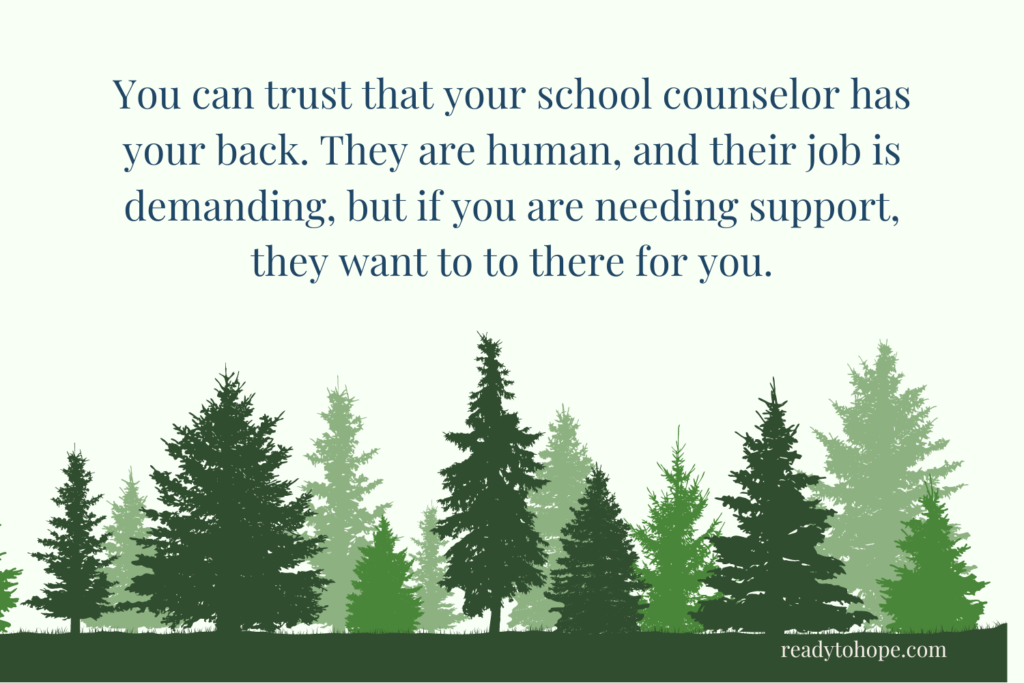How Your School Counselor Can Support Your Mental Wellness

As the school year gets under way, we are continuing our post series all about your school counselor- because they definitely have been misunderstood!
Today we are going to talk about how your school counselor can (and wants to!) support your mental wellness.
A lot of this will be a repeat of last week’s post about what you might not know about your school counselor (but would likely find helpful), but this week we want to spend time focusing more on how your counselor can really help you with the social and emotional stuff.
Just a reminder: your school counselor has a degree in counseling.
While it is possible that so far, you have only interacted with school counselors as those who help you choose your classes for next year, the truth is that their actual education has nothing to do with scheduling classes!
Scheduling classes, helping administer standardized tests, helping at graduation, even doing lunch or hall duty: none of these tasks are part of their education.
And yet, in case you haven’t realized by now: that is what they have to spend the vast majority of their time doing.

Sure, anyone can do hall duty, and honestly, anyone can probably sit in a room and be sure a group of students behaves while taking the PSAT. But when it comes to scheduling classes, it’s actually a good thing that it is a job done by your school counselor.
Because their goal is to get to know you as well as they possibly can, despite the constraints and the demands on their time, and help guide you towards the best courses for your interests, your aptitudes, and your desired post-high school goals.
So your school counselor has training on how to connect with you, and wants to get to know you to help you towards your goals, but let’s double back around: they are still trained to do counseling.
Your school counselor has the training and experience to support you when you struggle with stress, overwhelm, anxiety, sadness, and any other emotion that might be dragging you down during your school day.
While the nature of the job demands that they spend a lot of their time scheduling classes and all the rest, they went to school for at least two years after college specifically to learn how to support your social and emotional needs.
They took classes on individual counseling, group counseling, counseling theory, ethics, diversity, and more.
Then, they spent time doing practical supervised training, where they were able to learn the actual skills required of a counselor.

So when it all comes together: your school counselor is equipped to handle whatever you want to bring to them. Truly. They are a safe person for whatever you’re facing.
Things you can take to your school counselor include:
- Struggling to be motivated to succeed in class.
- Struggling daily with just feeling sad.
- Having a hard time making friends.
- Having a hard time with your friends- excluding you, pressuring you, etc.
- Bullying. (Especially bullying! And not simply to make the bully or bullies stop, but to be sure they’re not hurting others as well, and even to help them to figure out why they’re bullying- because we know that hurt people hurt people, right?)
- Home problems: arguing with parents, abuse or neglect. It’s all okay to bring to them.
- Drugs and alcohol: feeling like you have a problem, that your friend or boyfriend or girlfriend has a problem, that your parent has a problem.
- And anything else that might be making your life challenging to the extent that you are struggling to succeed in school.
And here’s another really important point: your counselor has made a commitment to honor confidentiality.
What does confidentiality mean? It basically means that what you share with your counselor stays between you and your counselor.
If you are being bullied but don’t want the bullies to know that you talked to your counselor, your counselor will honor that request.
If you are struggling with drinking too much and don’t want to talk to your parents about it, your counselor will honor that request.
While there are (very important) exceptions (read on), what you take to your counselor stays in that room.
What are the exceptions? By law, if your counselor learns about child abuse happening, or about someone who intends to harm themselves or others, your counselor must be sure that information is addressed properly.
However- that does not always mean that they will go straight to the authorities.
If you share information that touch on these areas, the first thing that your counselor will do is talk to you about next steps.
Their goal will be to be sure that anyone who could become a victim is safe, but they may do that by first working with you. Meaning- they don’t drop everything and go to the authorities, but they do everything they can to help you feel supported and empowered during the process.

Finally: while your school counselor is not able to do one-on-one therapy with you (as much as they might wish they could) they can connect you with the resources to get you whatever support you need.
We’ve addressed that the reality of being a school counselor is that their position requires that they do in fact have a lot of desk work to do, to be sure that the school clicks along effectively and classes are filled properly.
We’ve addressed that they truly want to support your mental and emotional and social needs.
So how can they do that?
They will always listen to you, whatever you’ve got going on, they will make time to listen.
And if they aren’t able to help you in that moment- if what you’re struggling with will take time to get to the other side- they know how to connect you with the resource that will get you there.
So while they can’t do intensive therapy, they are committed to your mental wellness and will advocate for you and walk alongside you as you get the outside support that you need!

Hopefully this has helped you understand your school counselor a bit more, and feel more confident going to them for whatever is on your heart.
And for reference, one of the resources they might connect you with? Ready to Hope workshops!
Our workshops can be a way to connect with other students, build a social network for when you need support (or just to hang out!), and practice mental wellness tools that you can then lean on when you need them.
Find out more about workshops by getting on our email list or going here!
And don’t forget to follow along on Instagram by clicking below!



